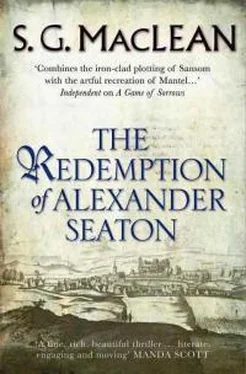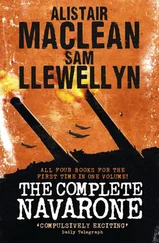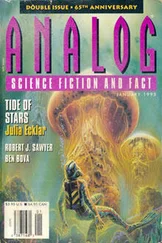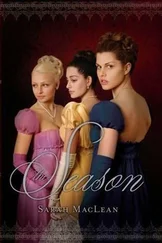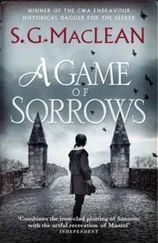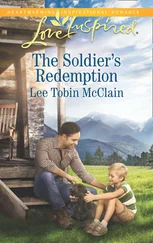I was in luck that the ferry had not yet put up for the night and I would not have to spend it in the ferryman’s mean hut on the east bank of the Deveron. It was one of Paul Black’s sons who had the watch that night. I hailed him across the river and he came slowly to his feet and stood looking at me for a while before going to untie the boat. Even at this distance across the river mouth I fancied I sensed some reluctance in him to come across for me. When he finally came to the shore on the other side he did not look at me.
‘It is Martin, is it not?’
‘Aye, Mr Seaton,’ he replied in a low voice, still avoiding my eye.
‘What is the matter? What is happening in the town tonight?’
He made no reply.
‘Martin, come, you know me. Whatever they say, you need have no fear of me.’
Now he looked at me. ‘It is not you, Mr Seaton, it is … the town. Everything has gone wrong in the town. I think,’ he hesitated before continuing, ‘I think we have been damned.’
‘What has happened?’
His eyes glazed over and he seemed to look past me, at nothing. ‘Marion Arbuthnott is dead, by her own hand. Her body lies at Dr Jaffray’s.’
I spent some effort in persuading him to ferry me back to the other side. The coining I handed him once the beast and I had disembarked fell from his hand to the ground, but I could not tarry any longer over Martin Black. I mounted Gilbert Grant’s poor horse and sped him into a gallop, books and all, towards the town. Within minutes I was at Jaffray’s door. Tying the beast hastily in the stableyard I hammered on the back door, but to no avail. I ran round to the front, but was not answered there either. I pushed the door open – it was not on the bolt – and went, calling out for the doctor, to his surgical room. Ishbel came stumbling to meet me, her face streaked with tears. I pushed past her into the room. All was in disarray. Glass bottles smashed on the floor, a chair turned over and broken, instruments strewn across the work table and desk and onto the floor, and a bloodied winding sheet trailing from the table on which I knew he laid the dead. The stable boy was trying to make some order in the chaos. In the midst of it all sat the doctor, his clothing torn, an angry gash on his cheek. He stared blankly ahead of him.
My voice was hoarse. ‘Jaffray. What in the name of God has happened here?’
He shook his head and slowly looked up at me. ‘Hell has been here, Alexander. Hell has been here tonight. They have taken her, taken her poor dead body from this room, from that table, and burnt her for a witch.’ His head sank forward. Tears of utter despair rolled down his cheeks.
ELEVEN
Concerning Witches
The ashes still blew about the early morning marketplace. All was quiet. The images and sounds that had haunted me through the night were gone now, altogether gone. Alone, at the bottom of the sodden, lifeless pyre, crouched Edward Arbuthnott. He had no cloak or hat about him, and the wind blew through his clothing without remorse. He held his head in black-streaked hands and the tears still flowed down his cheeks. I walked over to him, conscious of the sound of my footfalls amongst the pools and ashes.
‘Come, Edward, she is not here. She was never here.’
The apothecary glanced up at me and slowly shook his head as if I did not understand. ‘They took her; they burnt her. My own girl, my princess. They burnt her here. Black.’
I took off my cloak and wrapped it around him. ‘She was gone, her soul long gone before they took her from Jaffray’s. She will be buried decently in the kirkyard. They will not triumph over her.’
‘In truth?’
‘In truth,’ I said.
‘And I can take her flowers there.’ He did not resist as I eased him to his feet. He shuffled uncomplainingly forward, like an old woman with no more interest in this world. I would not take him home yet: the hysterics of his wife would be no comfort, do no good to him, and the sight of him in such a condition might well finish her.
Where were the people, all the people who, on any other weekday morning, would have been here? There was not a soul to be seen but myself and my broken companion, and where there was usually bustle and human warmth there was now just silence and desolation. I glanced up at the town clock as I guided Arbuthnott away from the market cross and towards the schoolhouse and Mistress Youngson’s welcoming kitchen. The provost could wait on our meeting, on the letters in my bag another hour or two; I doubted whether he had yet had leisure to remember me or my business in these last days. Certainly, the man I had seen last night rise above the fury of the flames would have little thought of maps or painters.
I had heard the baying of the crowd long before I had seen it. As I ran from Jaffray’s door towards the marketplace, I had felt not that I was getting closer to the mob but it to me. The smell first and then the heat of it wrapped around my throat and stung my eyes as the relentless clamour for the flesh of its victim grew louder in my ears. And when I turned the corner to face the market cross the sight before me froze me where I stood. It was a vision of Hell that John Knox himself could not have conjured. The people of Banff had become one heaving mass of thick, blackened clothes, red-glowing faces, some alive with spittle and foaming at the mouth in their excitement, eyes gleaming and glinting with a desire that was not of God’s sending. The mass, consumed with its own success, pressed in on itself as the eagerness for its prey rose. There was a chanting, a rising chanting, and beyond it shrieking and screaming, worse than the gulls. Through it all there pierced an inhuman wailing, issuing from the throat of Marion Arbuthnott’s father. Gilbert Grant and some other decent men held him back from cleaving to his child as she burned. And she did burn. High, high above the heads of the crowd that fed upon her, her body, naked, the skin of the girl who had been so white as to be almost a ghost in life, burned to a dark and broken black, a gnarled, dry, unspeakable black, the hair on her singeing and crackling and curling and melting, the dead mouth open in a silent scream.
Disgust and horror overwhelmed me. My first instinct was to run from it, but I could not move. My feet were rooted to the ground and I could do nothing but stare, transfixed, at the terror. An arm grabbed mine and shook me from the stupor of revulsion. ‘Alexander! Thank God you are returned safe. Come, man, we must end this.’ Thomas Stewart, the town notary, was dragging me with him around the side of the crowd to the steps of the tolbooth. It was then that I saw Walter Watt. He was there, shouting instructions to the town serjeants and to the laird of Banff’s men who had been put at his disposal. Some other burgesses I saw too there, who had not succumbed to the clamour of the witch-mongers. Of the baillie there was no sign. The town serjeant was throwing out pistols to the men of the watch as the laird’s men drew their own. I, and some others, were handed swords and clubs. Thomas Stewart shouted to us that we were to circle round the crowd, no further one from the other than the length of a man’s arm with outstretched sword. It was hard to hear over the noise of the fire at its sickening work and the rising hysteria of the mob, yet within a short while, the ring was in place. And then a shot rang through the air. Walter Watt stood atop the scaffold cart, the moon now at its fullest clear behind him, the smoke from his pistol rising into the yellow darkness of the night. His eyes shone through the flames and his voice was clear above the clamour. ‘Get back, you curs, you filthy rabble. What court is this? I have your names, every one. You will never work another day, nor sleep another night in this burgh if you do not leave off this Devil’s work!’ He swung his arm, his pistol arm, towards the tolbooth. ‘You will all sweat there before this night is through.’
Читать дальше
